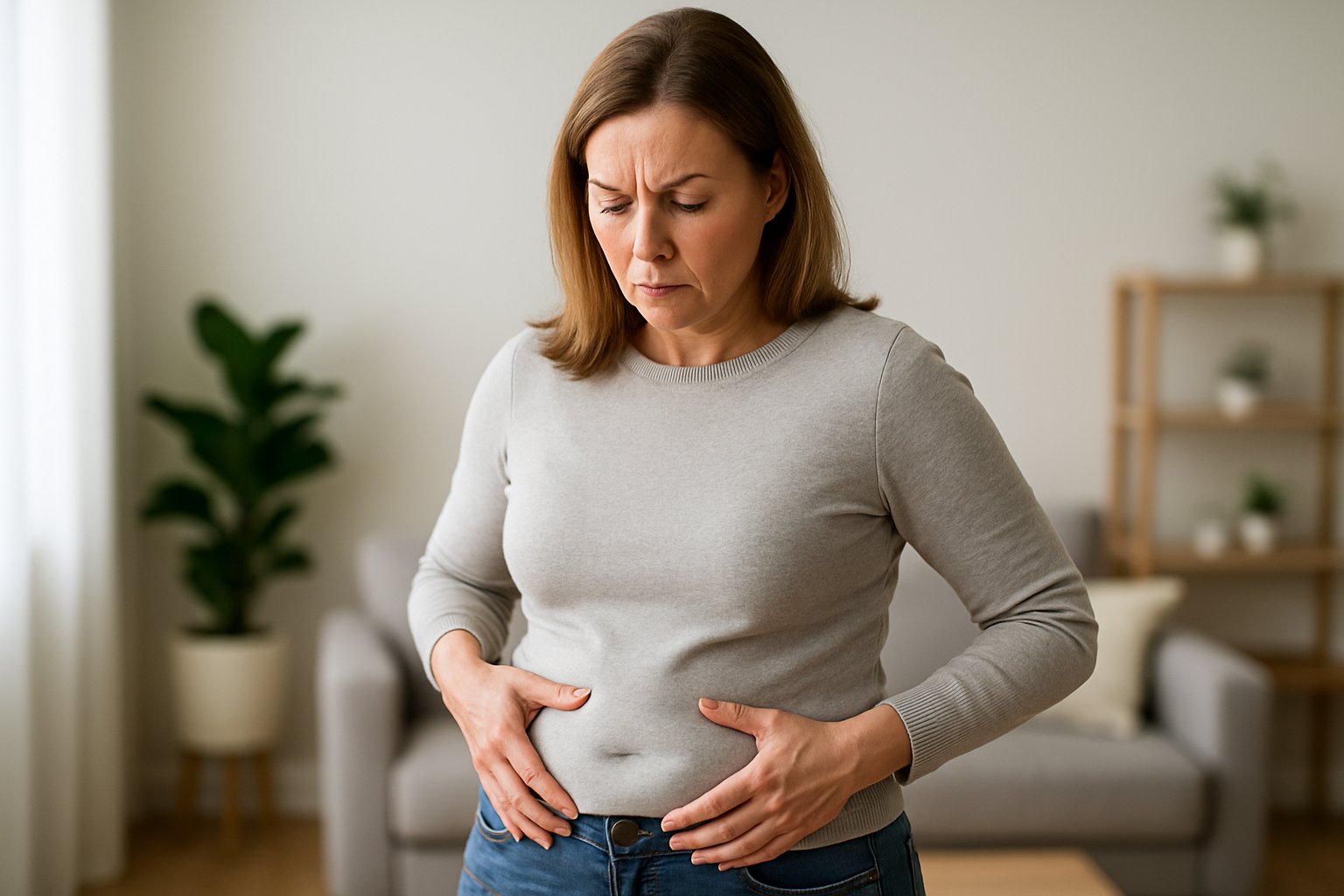Many women notice that losing weight becomes much harder after age 35, even when they follow the same diet and exercise routines that worked in their twenties and early thirties. This frustrating change often happens because of shifts in hormone levels that naturally occur as women age.

Recognizing the specific signs that hormones are interfering with weight loss can help women understand why their usual methods aren’t working and take steps to address the underlying issues. Common indicators include unexplained weight gain around the belly, constant cravings, ongoing fatigue, and difficulty building or keeping muscle mass despite regular workouts.
1. Unexplained weight gain around the midsection

Weight gain around the middle section often signals hormonal changes after age 35. This type of fat accumulation differs from general weight gain throughout the body.
Hormonal changes affect weight distribution around the midsection. Insulin resistance plays a key role in this process.
Cortisol levels can increase with age and stress. High cortisol promotes fat storage in the abdominal area.
Estrogen levels drop during perimenopause and menopause. This hormonal shift causes the body to store more fat around the waist.
Testosterone changes also affect body composition. Lower testosterone levels can lead to increased belly fat in both men and women.
The metabolic rate naturally slows down with age. This makes it easier to gain weight even with the same eating habits.
Insulin resistance becomes more common as people get older. This condition makes it harder to process carbohydrates effectively.
Sleep quality often decreases after 35. Poor sleep disrupts hunger hormones and increases cortisol production.
Chronic stress elevates cortisol consistently. This creates a cycle of increased appetite and midsection weight gain.
2. Persistent cravings despite a healthy diet

Even when eating nutritious meals, hormonal changes after 35 can trigger intense food cravings. These cravings often target sugary, salty, or high-fat foods that work against weight loss goals.
The hypothalamus controls appetite and cravings through hormone regulation. When hormones like insulin, cortisol, and leptin become imbalanced, this brain region sends mixed signals about hunger and satisfaction.
Stress, poor sleep, and hormonal fluctuations can trigger cravings for comfort foods. Women may notice stronger cravings during perimenopause due to declining estrogen levels.
Insulin resistance becomes more common after 35. This condition makes cells less responsive to insulin, leading to blood sugar spikes and crashes that fuel sugar cravings.
Leptin, the hormone that signals fullness, can become less effective with age. When leptin resistance develops, the brain doesn’t receive proper satiety signals, causing continued hunger even after adequate meals.
Frequent, intense cravings may indicate underlying hormonal imbalances that require attention. These persistent urges can sabotage healthy eating efforts and prevent successful weight management.
3. Fatigue that doesn’t improve with rest

When people get enough sleep but still feel exhausted, hormones might be the problem. This type of tiredness is different from normal fatigue because rest doesn’t help.
Hormonal fatigue occurs when the body’s hormone system gets disrupted. This can cause brain fog, poor focus, and constant tiredness that won’t go away.
Several hormones can cause this problem. Low thyroid function makes the body’s metabolism slow down. This leaves people feeling tired all the time.
Cortisol problems also cause fatigue. When stress hormones are too high or too low, energy levels drop. The body can’t recover properly from daily activities.
Fatigue that doesn’t resolve with rest is one of the most common complaints from patients with hormone imbalances. Low thyroid, cortisol problems, or imbalances in other hormones can all cause this tiredness.
If energy doesn’t bounce back despite rest, it’s time to consider hormones as a possible cause. This kind of fatigue makes weight loss much harder because the body lacks energy for exercise and daily activities.
4. Difficulty losing weight despite consistent exercise

You hit the gym regularly and follow your workout routine. Your trainer says you’re doing everything right. But the scale won’t budge.
This frustrating situation often points to hormonal imbalances that can hinder weight loss. Exercise alone cannot always overcome hormonal resistance.
Cortisol levels may spike from intense workouts. High cortisol tells your body to store fat, especially around your middle. Your hard work actually works against you.
Insulin resistance makes it tough to burn stored fat. Even with cardio and strength training, your cells struggle to use energy properly. The weight stays put.
Thyroid problems slow your metabolism. Your body burns fewer calories during and after exercise. What used to work in your twenties stops being effective.
Hormones can affect your body and weight more than diet and exercise habits. Your workout plan isn’t the problem.
Low growth hormone affects muscle building and fat burning. Without proper hormone levels, exercise benefits decrease significantly.
This explains why some people see fast results while others struggle. The difference often lies in hormone balance, not effort level.
5. Muscle loss combined with increased body fat
After 35, hormone changes can trigger a frustrating combination. The body starts losing muscle while gaining fat at the same time.
Low testosterone levels in women can lead to decreased muscle mass and increased body fat. This happens due to aging, stress, or over-exercising.
Growth hormone also declines with age. This makes it harder to build and keep muscle tissue.
Cortisol levels often stay high from chronic stress. High cortisol breaks down muscle protein while storing more fat around the midsection.
Insulin resistance becomes more common after 35. When cells don’t respond well to insulin, the body stores more calories as fat instead of using them for muscle repair.
Changes in female sex hormones can impact the distribution of both fat and muscle in the body. Estrogen and progesterone shifts affect where fat gets stored.
The scale might show weight loss, but clothes feel tighter. This suggests muscle is being lost while fat increases in problem areas like the belly and hips.
6. Mood swings and irritability

Hormonal changes after 35 can trigger unexpected mood swings and irritability. These emotional shifts often happen when estrogen and progesterone levels start to fluctuate during perimenopause.
Hormonal imbalance can lead to mood fluctuations by affecting brain chemicals like serotonin and dopamine. When these chemicals get disrupted, women may feel more anxious or sad than usual.
Cortisol, the stress hormone, also plays a role in mood changes. High cortisol levels can make someone feel on edge or easily frustrated throughout the day.
These mood changes can hurt weight loss efforts in several ways. Stress and irritability often lead to emotional eating or craving comfort foods high in sugar and fat.
When someone feels moody, they may skip workouts or choose less healthy foods. Sleep quality can also suffer, which further affects hormones that control hunger and metabolism.
Women may experience feelings of irritability, anxiety, or depression when hormones like estrogen, progesterone, and cortisol become unbalanced. Recognizing these mood patterns can help identify when hormones might be affecting weight loss progress.
7. Irregular sleep patterns or insomnia

Poor sleep wreaks havoc on hormones that control weight. When sleep patterns become irregular, the body struggles to maintain proper hormone balance.
Sleep loss increases cortisol levels. High cortisol promotes fat storage, especially around the midsection. This makes weight loss much harder after age 35.
Hormonal imbalances play a vital role in sleep quality and how well people fall asleep. The relationship works both ways – poor sleep disrupts hormones, and hormone changes cause sleep problems.
Lack of sleep affects hunger hormones too. It increases ghrelin, which signals hunger. It also decreases leptin, the hormone that signals fullness.
Sleep disorders increase inflammatory markers and accelerate diabetes and obesity development. This creates a cycle where poor sleep leads to weight gain and health problems.
Women over 35 face additional challenges. Changing estrogen and progesterone levels during perimenopause often cause sleeping problems and insomnia.
Getting seven to nine hours of quality sleep helps restore hormone balance. Consistent bedtime routines support better sleep patterns and weight management efforts.
8. Increased hunger and appetite fluctuations

After 35, hormonal changes can make hunger feel unpredictable and intense. Women may notice they feel hungry more often or crave specific foods they didn’t want before.
Several key hormones control appetite. Hormones like ghrelin, leptin, and cortisol shape appetite and affect how full someone feels after eating.
Ghrelin tells the brain when it’s time to eat. When this hormone increases, hunger becomes stronger and harder to ignore.
Leptin works the opposite way by signaling fullness. When leptin levels drop or the body stops responding to it properly, the feeling of being satisfied after meals disappears.
Sleep deprivation affects the hormones that control hunger. People who don’t get enough rest have bigger appetites and struggle to feel full.
Stress hormones like cortisol can also trigger cravings for high-calorie foods. This makes it much harder to stick to healthy eating plans.
Increased cravings due to hormonal fluctuations can disrupt diet plans and make weight loss goals feel impossible to reach.
9. Slow metabolism causing reduced calorie burn
A slow metabolism means the body burns fewer calories at rest. This makes weight loss much harder after 35.
Age-related muscle loss affects metabolic rate. Less muscle tissue means the body needs fewer calories to function.
Hormonal changes also play a role. Low cortisol levels can slow metabolism significantly. This leads to low energy and difficulty maintaining healthy weight.
Thyroid problems become more common with age. An underactive thyroid reduces the rate at which the body burns calories.
Chronic stress releases cortisol, which slows metabolism. This hormone also causes the body to store more fat.
Poor sleep and yo-yo dieting can suppress metabolic rate. These factors become more problematic as people age.
Signs include feeling tired, cold, and having digestive issues. Weight gain despite eating the same amount is another common sign.
People with slower metabolisms must work harder to lose weight. They burn fewer calories throughout the day compared to those with faster metabolisms.
How Hormonal Changes Affect Metabolism After 35
Estrogen and progesterone decline significantly after age 35, directly impacting how the body burns calories and stores fat. Thyroid hormone production also decreases, slowing metabolic rate and making weight loss more difficult.
The Role of Estrogen and Progesterone in Weight Regulation
Estrogen levels begin to fluctuate and decline after age 35. This hormone directly controls where the body stores fat and how efficiently it burns calories.
When estrogen drops, the body tends to store more fat around the midsection. The hormone also helps maintain muscle mass, which burns more calories than fat tissue.
Progesterone decreases more quickly than estrogen, creating an imbalance. Low progesterone levels can cause:
- Water retention and bloating
- Increased appetite for sugary foods
- Sleep disruption that affects metabolism
- Higher cortisol levels that promote fat storage
The combination of low estrogen and progesterone makes the body more likely to store calories as fat. It also reduces the metabolic rate, meaning fewer calories are burned at rest.
Impact of Thyroid Hormones on Metabolic Rate
Thyroid hormones control the body’s metabolic rate. Subtle declines in thyroid function contribute to fatigue and slower metabolism after age 35.
The thyroid produces T3 and T4 hormones that regulate how quickly cells use energy. When these hormones decrease, the metabolism slows down significantly.
Women with declining thyroid function may experience:
- Unexplained weight gain despite eating the same amount
- Feeling cold more often than usual
- Fatigue and low energy levels
- Difficulty losing weight even with diet and exercise
Even small changes in thyroid hormone levels can reduce metabolic rate by 10-15%. This means the body burns fewer calories throughout the day, making weight maintenance more challenging.
Strategies to Support Hormonal Balance
Supporting hormonal balance after 35 requires targeted dietary choices that stabilize blood sugar and reduce inflammation. Simple lifestyle changes like stress management and consistent sleep patterns can restore hormone function and boost metabolism.
Dietary Recommendations for Hormonal Health
Protein intake forms the foundation of hormonal balance. Women over 35 need 25-30 grams of protein at each meal to support insulin sensitivity and maintain muscle mass.
Lean sources include chicken breast, fish, eggs, and Greek yogurt. Plant-based options like lentils and quinoa provide additional fiber benefits.
Healthy fats support hormone production and reduce inflammation. The body uses these fats to create estrogen, progesterone, and cortisol.
Include these daily:
- Avocados (1/2 medium)
- Olive oil (2 tablespoons)
- Nuts and seeds (1/4 cup)
- Fatty fish (3-4 ounces twice weekly)
Blood sugar stability prevents insulin spikes that disrupt other hormones. Managing stress and eating well-balanced meals helps maintain hormone balance.
Fiber-rich vegetables slow sugar absorption. Aim for 25-35 grams of fiber daily through broccoli, spinach, and Brussels sprouts.
Lifestyle Adjustments to Improve Hormone Function
Sleep quality directly impacts cortisol and growth hormone production. Adults need 7-9 hours of consistent sleep to maintain hormonal balance.
Keeping a regular sleep schedule supports natural hormone rhythms. Going to bed and waking at the same time trains the body’s internal clock.
Stress management reduces cortisol levels that interfere with weight loss. Chronic stress elevates cortisol, which promotes fat storage around the midsection.
Effective stress-reduction techniques include:
- Deep breathing exercises (5-10 minutes daily)
- Regular walking or yoga
- Meditation or mindfulness practice
- Setting boundaries with work and technology
Movement patterns boost metabolism and improve insulin sensitivity. Strength training twice weekly helps maintain muscle mass, which naturally declines after 35.
Limiting caffeine and alcohol reduces stress on the adrenal glands. Caffeine after 2 PM can disrupt sleep cycles and cortisol production.
Frequently Asked Questions
Women over 35 often struggle with weight changes linked to shifting hormone levels, including unexplained belly fat and persistent cravings. These hormonal shifts can make traditional weight loss methods less effective and create new challenges around metabolism and body composition.
What are the indicators of hormonal weight gain as women age?
Hormonal weight gain typically appears as stubborn fat around the midsection that resists diet and exercise efforts. Women may notice their waistline expanding even when their overall weight stays the same.
Increased cravings for sugary or salty foods become more frequent and intense. These cravings often occur regardless of how well a woman is eating throughout the day.
Energy levels drop significantly, creating fatigue that doesn’t improve with adequate sleep or rest. This tiredness can make it harder to stay active and maintain healthy habits.
Muscle mass begins to decrease while body fat increases, even when women maintain their regular workout routines. This shift changes body composition and can slow metabolism.
Can resetting hormones naturally help with weight loss in females over 35?
Natural hormone balancing can support weight loss efforts by addressing the root causes of metabolic changes. When key hormones like insulin, cortisol, and estrogen function properly, the body can burn fat more efficiently.
Sleep quality plays a crucial role in hormone regulation. Getting 7-9 hours of consistent sleep helps balance hunger hormones and reduces cortisol levels.
Stress management techniques like meditation or yoga can lower cortisol production. High cortisol levels promote belly fat storage and increase food cravings.
Regular strength training helps maintain muscle mass and supports healthy hormone production. Building muscle also boosts metabolism and improves insulin sensitivity.
What role does hormonal imbalance play in rapid weight changes?
Hormonal imbalances can trigger sudden weight fluctuations by disrupting normal metabolism and fat storage patterns. When hormones shift quickly, the body may respond with rapid changes in appetite, energy, and fat distribution.
Insulin resistance can develop, making it harder for cells to use glucose for energy. This forces the body to store more calories as fat, particularly around the abdomen.
Thyroid hormone changes can slow metabolism significantly. Even small decreases in thyroid function can lead to weight gain within weeks or months.
Estrogen fluctuations during perimenopause can cause water retention and bloating. These changes can create weight swings of several pounds within days.
Which supplements are effective for balancing hormones to aid in weight reduction?
Omega-3 fatty acids help reduce inflammation and support healthy hormone production. These supplements can improve insulin sensitivity and reduce cortisol levels.
Magnesium supports over 300 enzyme reactions in the body, including those involved in hormone synthesis. Many women don’t get enough magnesium from food alone.
Vitamin D deficiency is common and can affect insulin function and metabolism. Adequate vitamin D levels support healthy weight management and hormone balance.
Probiotics may help balance gut bacteria, which influences hormone production and metabolism. A healthy gut microbiome supports better nutrient absorption and hormone regulation.
Are there natural ways to correct hormonal imbalances in women for weight management?
Eating protein at every meal helps stabilize blood sugar and reduces insulin spikes. This prevents the body from storing excess calories as fat and reduces cravings.
Limiting processed foods and added sugars prevents blood sugar roller coasters. Stable blood sugar levels support better hormone function throughout the day.
Intermittent fasting can improve insulin sensitivity and support healthy cortisol patterns. However, women should approach fasting carefully to avoid disrupting reproductive hormones.
Regular movement throughout the day, not just formal exercise, helps regulate hormones. Simple activities like walking after meals can improve insulin function.
Why might women experience difficulty losing weight due to hormonal changes after 35?
Estrogen levels begin declining in the mid-30s, which slows metabolism and changes fat distribution patterns. Lower estrogen makes it easier to gain weight around the midsection.
Muscle mass naturally decreases by 3-8% per decade after age 30. Less muscle means a slower metabolism and reduced calorie-burning capacity.
Hormonal belly fat resists traditional weight loss methods because internal imbalances drive it rather than simply eating too many calories. This type of fat requires addressing the underlying hormone issues.
Insulin sensitivity often decreases with age, making it harder for the body to process carbohydrates efficiently. This can lead to increased fat storage and difficulty accessing stored fat for energy.